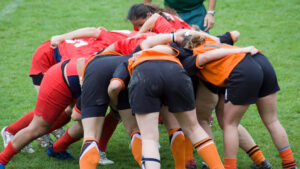Today we host the Anniversary’s Match between the University of Bath’s men’s rugby team and (this year) our south-west rivals Exeter, at The Rec. This comes hot on the heels of the Red Roses’ win in the 2025 Women’s Rugby World Cup, and our women’s team will be cheering on the action from their own box.
Rugby is perhaps the sport most strongly associated with the south-west, but sport in all its forms is a central part of the University’s identity. Whether elite or participatory, sport is part of the personal development that is at the heart of the student experience at Bath (which extends well beyond sport to any number of extracurricular activities).
But Bath also strives to be a place where everyone in our community can access the same opportunities and thrive. This is something that myself - as PVC for Student Experience and Sport - and our new Deputy Vice Chancellor Marcus Munafò - as EDI lead for the University - have been thinking about a great deal recently.

Sport can provide a lens through which to understand that equality of opportunity and what it brings. The success of the Red Roses, for example, has elevated women’s rugby in the national consciousness in a way that will have real impact - from spectator numbers to grassroots participation.
It's easy to forget how hard won that can be. For many years, and in many sports, the women’s game has been a poor relation.
Marcus has told me about the long journey his own sport of rowing has been on. When women were finally allowed to race in the rowing World Championships in 1974 it was only over 1,000 metres, half the distance the men rowed over. It was only extended to 2,000 metres to be the same as men ten years later.
And women’s rowing at Henley Royal Regatta - the most prestigious rowing event in the UK - was only introduced in 1999 (two years after the first Harry Potter book was published!). Our Bath alumna (and Honorary Graduate) Heather Stanning, double Olympic champion, couldn’t compete in her boat class because there simply wasn’t an event in that boat class for women until 2017, after she had retired.
But change can also happen quickly.
When Dame Helena Morrisey (now Baroness Morrisey) was CEO of Newton Investment Management she refused to sponsor the Boat Race unless the funding was equally split between the men’s and women’s teams, and both given equal billing on the Tideway - something previously described as “impossible” (when the men were in charge).
Before then, the men received lavish funding, the women nothing. And the men’s Boat Race was held on the Tideway in London, televised to a global audience, while the women raced two weeks earlier upstream in Henley on Thames to a tiny audience. That changed almost overnight when there was the will and the courage to do so.
The challenge to us as a University, if we really are to celebrate sport in all its forms - from elite to grassroots - is to ensure that we also demonstrate our commitment to equality of opportunity. There cannot be any poor relations, any discrepancy in the opportunities and support available.
This extends beyond sport, of course. But in many ways sport represents a microcosm of society, and a litmus test of how far we have really come in creating an environment where there is equality of opportunity for everybody. And as a University we are committed to equality of opportunity.
Both myself and Marcus are keen to ensure we live up to this commitment, working across our community and alongside the Students’ Union. And if you’re aware of areas where we can do better, please let us know - whether in sport or beyond! We’ve come a long way, but we have further to go.
Read about how research at Bath is making sport more inclusive in this Research with Impact article.
Respond
